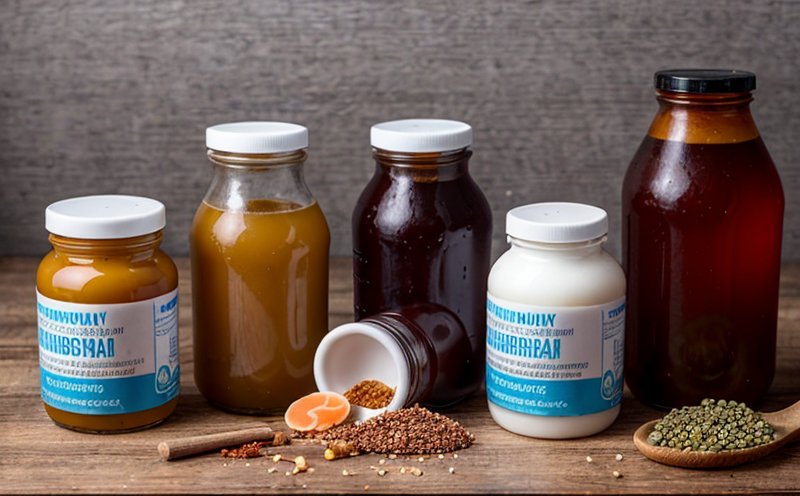OECD Fermented Product Microbial Safety Testing
The OECD (Organisation for Economic Co-operation and Development) Fermented Product Microbial Safety Testing is a comprehensive suite of microbiological tests designed to evaluate the safety profile of fermented foods, beverages, and other products. This service ensures that the microbial content in these products is within safe limits as per international standards. The OECD guidelines are widely recognized for their stringent testing requirements which cover pathogen detection, spoilage organism enumeration, and other relevant microorganisms.
The process involves several critical steps to ensure accuracy and reliability of results:
- Sample collection: Samples must be collected under strict aseptic conditions to maintain the integrity of the microbial content.
- Transportation: Samples should be transported in an appropriate medium or container that supports microbial growth if necessary, ensuring they remain viable until analysis.
- Preparation: Specimens undergo meticulous preparation including homogenization and dilution processes tailored to the specific product type.
- Analytical methods: Utilizing advanced microbiological techniques such as culture-based methods, molecular diagnostics (PCR), and rapid screening technologies.
These tests are crucial for ensuring that fermented products do not pose health risks due to contamination by harmful microorganisms. Compliance with OECD guidelines is essential for producers aiming to meet global safety standards and maintain consumer trust.
| Test Type | Description | Significance |
|---|---|---|
| Culture-based methods | Detection of specific pathogens and spoilage organisms through traditional culture techniques. | Provides a reliable count of viable microorganisms, aiding in risk assessment. |
| Molecular diagnostics (PCR) | Identification of target sequences associated with known pathogens or spoilage agents. | Offers high sensitivity and specificity for detecting low-level contamination. |
| Rapid screening technologies | Quick initial assessments using lateral flow assays, ELISA kits, etc., to screen large batches of products. | Facilitates early identification of potentially unsafe products for prompt action. |
The OECD guidelines also emphasize the importance of traceability and data integrity throughout the testing process. This includes maintaining detailed records of all procedures, equipment calibration logs, and any deviations from standard operating procedures.
Eurolab Advantages
At Eurolab, we pride ourselves on offering unparalleled expertise in OECD Fermented Product Microbial Safety Testing. Our team of highly qualified microbiologists and quality assurance specialists ensures that every test adheres strictly to the latest international standards.
- Comprehensive Expertise: Our staff has extensive experience in handling various fermented products, from traditional soy sauce to modern kombucha.
- State-of-the-Art Facilities: Equipped with advanced microbiological laboratories and sophisticated instrumentation capable of performing even the most complex analyses.
- Strict Compliance: Every test conducted is compliant with OECD guidelines, ensuring accuracy and reliability of results.
- Rapid Turnaround Time: We understand the importance of timely reports for decision-making processes. Our efficient workflow allows us to deliver accurate results quickly without compromising on quality.
In addition to our technical capabilities, Eurolab is committed to fostering long-term relationships with clients through transparent communication and proactive support. Our goal is not just to meet but exceed expectations, thereby building trust and credibility in the industry.
Customer Impact and Satisfaction
The OECD Fermented Product Microbial Safety Testing service provided by Eurolab has significantly impacted our customers' businesses. By ensuring that their products meet stringent safety standards, we help them protect public health while also maintaining brand reputation.
- Increased Consumer Confidence: Safe and reliable products lead to higher consumer satisfaction and repeat purchases.
- Better Decision Making: Accurate test results allow companies to make informed decisions regarding product development, formulation adjustments, and process improvements.
- Regulatory Compliance: Ensures adherence to international regulations which is crucial for exports into different markets.
Customer feedback consistently highlights the value of our services. Many have reported increased efficiency in their compliance processes and enhanced product safety, leading to better market performance overall.
Use Cases and Application Examples
- Dairy Products: Ensuring the absence of pathogens in fermented dairy products is crucial for preventing foodborne illnesses.
- Fermented Beverages: Detecting spoilage organisms and ensuring alcohol content levels are accurate helps maintain product quality.
- Soy-Based Products: Checking for mold growth and other contaminants ensures the safety of these popular dietary supplements.
Real-world examples include a leading yogurt manufacturer who used our services to identify a contamination issue early in its supply chain, thus avoiding costly recalls. Another case involved a major brewery that utilized our testing to adjust their fermentation process and improve shelf life of their products.





